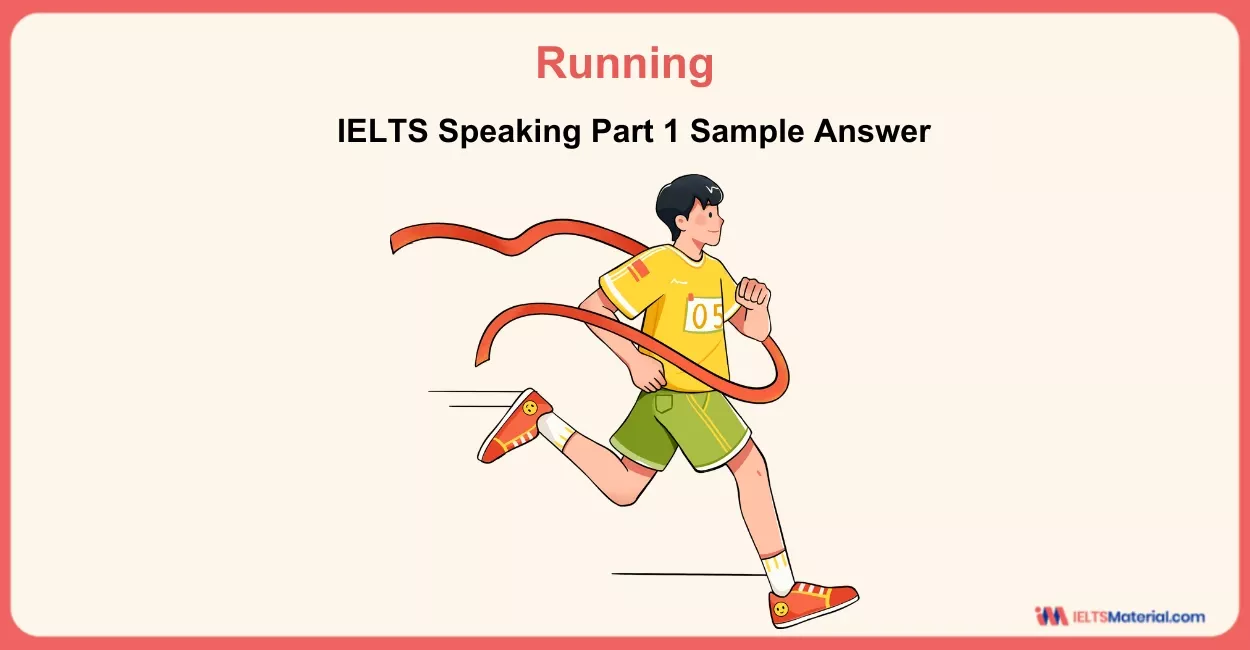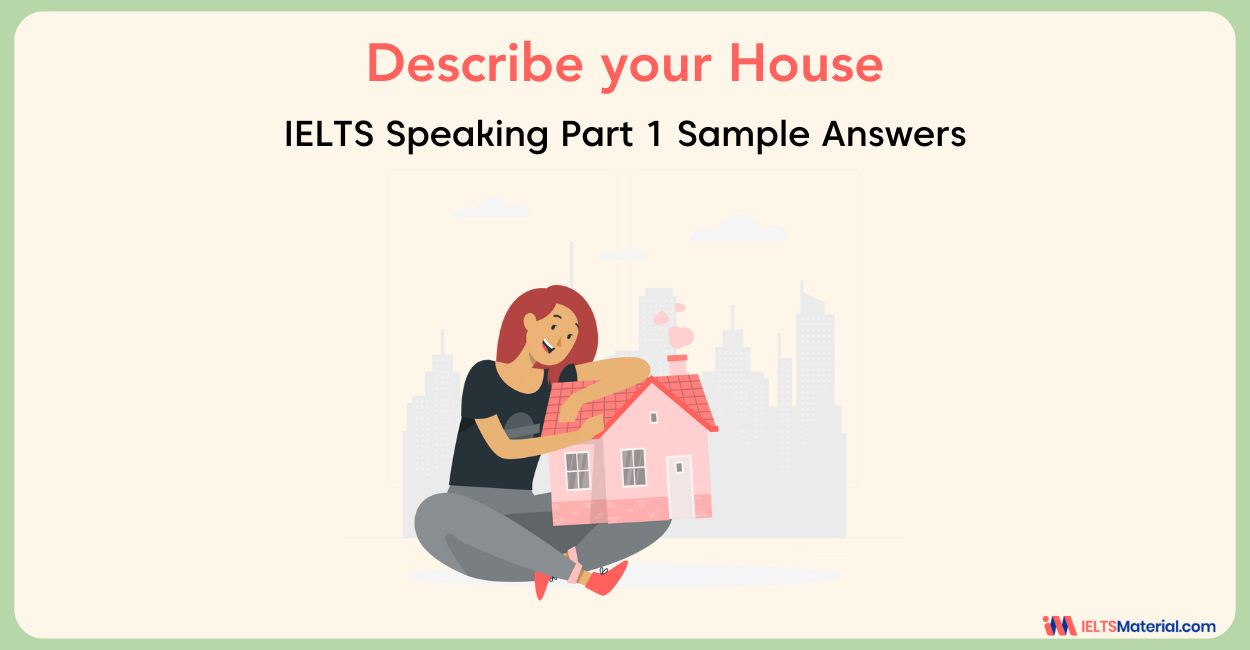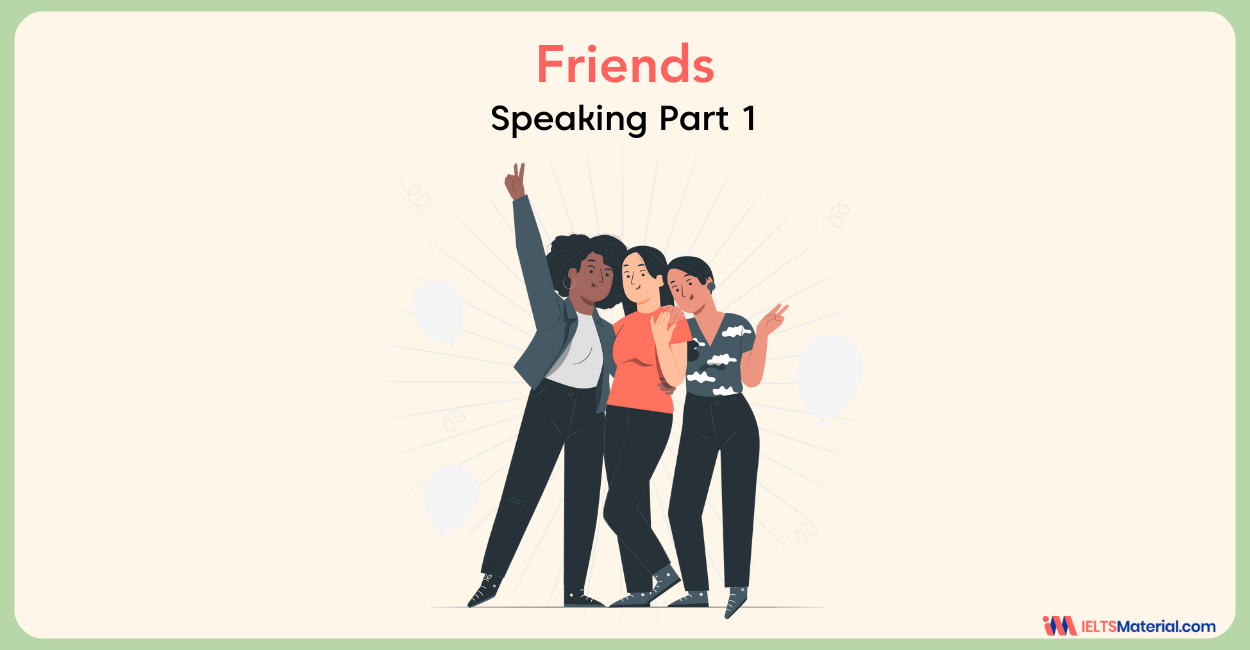Friends IELTS Speaking Part 1 Sample Answers
11 min read
Updated On
-
Copy link
Develop your skills as an English speaker and achieve a higher band score by using our friends IELTS speaking part 1 sample Band 9 answers. Also, expand your IELTS vocabulary and apply our expert tips to enhance your answers and gain fluency & confidence.
Table of Contents

Get a Complimentary IELTS Speaking Strategies PDF
Friends Speaking Part 1 is one of the most popular IELTS Speaking Part 1 topics that all IELTS candidates must prepare for. Besides learning to frame an impressive response, you must expand your vocabulary and improve your speaking abilities. This blog will help you with both through the sample answers and a collection of common English words in IELTS Speaking.
Let’s have a look at the Friends IELTS Speaking Part 1 Sample Answers given by IELTS candidates, followed by IELTS expert answers. They will enable you to understand how to make your answers better for a better IELTS band score.
Friends IELTS Speaking Part 1 Questions for IELTS
Below, you will find actual IELTS Speaking Part 1 questions related to friends, along with sample responses to guide you through similar IELTS Speaking Part 1 topics.
1 Do you have a lot of close friends? (or) Tell me about your friends? (or) Do you have many friends?
I have only one friend I would confide in. I’m quite picky and more importantly, I have a somewhat irrational fear that none of my friends really like me and that I’m just a guy they can barely tolerate and it is hard for me to live in harmony with them.
- Analysis:
This answer gives a personal and emotional response, using advanced expressions like ‘irrational fear’ and ‘confide in’. The vocabulary is appropriate, and the response is structured.
- Alternative Band 9 Answer:
I have a small circle of close friends whom I can trust implicitly. I value quality over quantity when it comes to friendships, as I believe it’s better to have a few genuine connections rather than many superficial ones. My best friend, for instance, has been a constant source of support and encouragement throughout my life.
2 Do you think friendship is important?
There is no doubt that friendships play a vital role in our life. They make our lives interesting and wonderful. They help us develop a sense of sharing whether they are tangible things or just inspirational or motivational words of wisdom.
- Analysis:
The answer is clear, with good organization and appropriate expressions like ‘play a vital role’ and ‘inspirational or motivational words of wisdom’.
- Alternative Band 9 Answer:
In my opinion, friendship is undeniably important as it provides emotional sustenance and enriches our lives. True friends are those who stand by you in both good and bad times, offering not only practical help but also a shoulder to lean on. They create memories that make life more vibrant and meaningful.
3 Which do you prefer: to spend time with a friend or spend time alone? (or) How often do you go out with your friends?
It depends. Normally, I’m more of a loner and generally spend more time in solitude than with friends. But when I’m in a bad mood, loneliness makes me feel isolated from the whole world. On those days, I will hang out with my friends so that sad and unhappy thoughts don’t come into my mind.
- Analysis:
The answer is detailed and reflects flexibility depending on mood. The vocabulary, such as ‘loner’ and ‘solitude’, is apt and expressive.
- Alternative Band 9 Answer:
It really depends on my mood. Generally, I cherish solitary moments as they allow me to recharge and reflect. However, when I feel low, spending time with friends uplifts my spirits. My friends and I often plan casual outings to relax and forget our worries, making those moments truly enjoyable.
4 What kind of people do you like to have as friends?
I find myself attracted to people who are honest and who know how to behave with others. I always avoid making friends with people who have a superiority complex.
- Analysis:
The response is well-structured, and vocabulary like ‘honest’ and ‘superiority complex’ shows good word choice.
- Alternative Band 9 Answer:
I am drawn towards people who are genuine and empathetic. I deeply appreciate friends who possess emotional intelligence and treat others with respect. To me, a trustworthy companion who values mutual understanding is far more appealing than someone who exudes arrogance or a sense of superiority.
5 Do you like face-to-face conversations with people?
Actually, I like to talk with cyber friends more than having real-world conversations. I think others observe me a lot; they judge me and hence I become very self-conscious and shy away from speaking face to face.
- Analysis:
The answer provides a clear preference with reasoning, and terms like ‘self-conscious’ and ‘cyber friends’ are relevant.
- Alternative Band 9 Answer:
While I find online interactions convenient, I prefer face-to-face conversations as they allow for deeper connections and better understanding through non-verbal cues like facial expressions and body language. That said, I sometimes feel shy during in-person talks, but my close friends help me feel at ease.
6 Are most of your friends from school or outside school?
Most of my friends are from high school. People who I met at work or from clubs have less in common with me, whereas at Uni we shared common interests.
- Analysis:
The answer is specific, comparing different groups of friends with good reasoning.
- Alternative Band 9 Answer:
Most of my closest friends are from high school because we share fond memories and common interests. While I have acquaintances from work and clubs, those friendships often lack the depth and shared history that make school friendships special.
7 How often do you meet with your friends?
When I was younger, I used to meet my friends almost every day. Even friends outside of school were a part of my daily social interaction. But now, as a 23-year-old working professional, I barely meet anyone during weekdays. I meet my closest friends only on weekends. These meetups are sporadic too.
- Analysis:
The answer provides a timeline comparison, which adds depth. Words like ‘sporadic’ and ‘interaction’ are well-used.
- Alternative Band 9 Answer:
These days, I only meet my friends sporadically, usually on weekends, as my busy schedule doesn’t allow for frequent gatherings. However, during my school days, I would meet them almost daily, cherishing every moment of carefree camaraderie.
8 What do you and your friends do together?
My closest friends and I have a mutual interest in shopping for clothes. So whenever we have time, we will go shopping together until we break the bank. Sometimes when we are out of money, just window shopping would be enough.
- Analysis:
The answer is specific and includes relatable activities like ‘shopping’ and ‘window shopping’.
- Alternative Band 9 Answer:
My friends and I enjoy a variety of activities, but our favorite pastime is going shopping together. Whether it’s splurging on trendy outfits or just window shopping, we always have a great time. Occasionally, we also explore new cafes or watch movies to unwind and bond.
9 How do people in your country meet others and make friends?
I don’t think it matters what country you’re from. In every country, you can make friends just by sitting next to someone a few times during class, then a friendship logically happens. Otherwise, you can make cyber friends through social networks like Facebook or Twitter.
- Analysis:
The response is universal and relatable, mentioning both in-person and online methods.
- Alternative Band 9 Answer:
In my country, people often make friends through shared experiences such as school, work, or community events. Social media platforms like Facebook and Instagram also serve as popular ways to meet and connect with others, making virtual friendships a common phenomenon.
10 Do adults and children make friends in the same way?
Adults use self-disclosure to develop trust and loyalty among friends. This is quite complicated in practice while children usually use common interests and goals as the basis of their friendships. More importantly, kids have a whale of a time with whoever, but adults have to use their time for work and taking care of their family.
- Analysis:
The answer contrasts the two groups effectively and uses terms like ‘self-disclosure’ and ‘common interests’.
- Alternative Band 9 Answer:
Children typically form friendships through shared activities and playful interactions, which come naturally to them. Adults, on the other hand, rely more on emotional connections and mutual trust. While kids enjoy friendships effortlessly, adults often face challenges like time constraints and responsibilities.
11 Do you think it is possible to become real friends with people you meet on the internet?
Of course, it is possible to establish real friendships through the internet. What you need in a friendship is truthfulness, reliability, empathy, respect and loyalty. If you’re getting all that from your online friends then you can consider them as genuine friends.
- Analysis:
The answer is optimistic and highlights key traits like ‘truthfulness’ and ‘empathy’.
- Alternative Band 9 Answer:
Absolutely, it is possible to build authentic friendships online. As long as there is mutual trust, reliability, and emotional support, these connections can be as meaningful as in-person ones. Many of my cyber friends have become a significant part of my life.
Shy to speak? Book IELTS demo classes to boost your Speaking now!
Friends Speaking Part 1 Vocabulary
Using the latest IELTS Speaking vocabulary to boost your score is key to making a strong impression and improving your band score in the speaking module. Here are some words used in the sample answers of Friends IELTS Speaking Part 1.
|
Word |
Meaning |
Example Sentence |
|---|---|---|
|
Companion |
a person you spend a lot of time with or travel with |
During college, my roommate became more than just a companion—he turned into a true friend. |
|
Acquaintance |
a person you know slightly, but who is not a close friend |
Although we went to the same school, we were just acquaintances, not close friends. |
|
Bond |
a close connection joining two or more people |
I share a strong bond with my childhood friend, even though we live in different countries. |
|
Loyal |
firm and not changing in your friendship or support |
She is a loyal friend who always stands by me, no matter what. |
|
Trustworthy |
able to be relied on as honest or truthful |
It’s hard to find someone as trustworthy as Raj when it comes to keeping secrets. |
|
Picky |
very careful or too careful about choosing or accepting things |
He is too picky to have just one close friend. |
|
Cordial |
warm and friendly |
Although we aren’t best friends, we maintain a cordial relationship at work. |
|
Buddy |
a friend; often used in informal speech |
I’ve known my gym buddy for over five years—we motivate each other every day. |
|
Get along (with) |
to have a friendly relationship |
I get along really well with my office mates—we often hang out after work. |
|
Like-minded |
having similar interests or opinions |
Most of my friends are like-minded people who enjoy discussing books and ideas. |
|
Hang out |
to spend time relaxing or enjoying oneself |
We usually hang out at the café near campus on weekends. |
|
Confide in |
to share your secrets with someone because you trust them |
I always confide in my best friend when I face any kind of emotional stress. |
|
Get-together |
a small informal meeting or party |
We had a lovely get-together last Friday to celebrate our long-lasting friendship. |
|
Reliable |
someone you can trust to do what is expected |
He’s the most reliable friend I have—always there when I need him. |
|
Supportive |
giving help, or encouragement |
My best friend is incredibly supportive, especially during exam season. |
|
Fall out (with) |
to have an argument and stop being friendly |
I fell out with my friend last year, but we’ve recently started talking again. |
|
Emotional sustenance |
support, or nourishment for one's emotional well-being |
True friendship offers emotional sustenance during the toughest phases of life. |
|
Camaraderie |
a feeling of trust and friendship among people who spend a lot of time together |
School days were filled with laughter and camaraderie that I still cherish. |
|
Empathetic |
able to understand how someone else feels because you can imagine what it is like to be them |
I prefer to surround myself with empathetic people who genuinely care about others. |
|
Self-disclosure |
the act of sharing personal information with others |
Adults often rely on self-disclosure to form deeper friendships. |
|
Common ground |
shared interests, beliefs, or opinions |
Friendships often begin when two people find common ground during a conversation. |
|
Emotional intelligence |
the ability to recognize, understand and manage your own emotions and those of others |
I value friends who show emotional intelligence and respond sensitively to situations. |
Grab Our 4.5+ Rated Speaking Course Now to Level Up! Join Now!
Bonus Questions & Answer for Practice on Friends Speaking Part 1
Now that you have got an idea of what makes your IELTS Speaking answers impressive, it is time to practice these bonus questions on friends. In case you need guidance or feedback on your Friends Speaking Part 1 sample answers, feel free to book IELTS online classes and talk to our IELTS experts.
- What do you think makes people have a long friendship?
Long-lasting friendships often rely on trust, mutual respect, and understanding. People in such friendships accept each other’s flaws and celebrate their strengths. Effective communication, emotional support during difficult times, and shared experiences also play crucial roles. Forgiveness and the ability to adapt as both individuals grow over time further strengthen the bond.
- Does it make things easier in a friendship if you have similar interests?
Yes, having similar interests can make a friendship smoother as it provides common ground for conversations and activities. Shared hobbies or passions allow friends to spend quality time together and deepen their connection. However, having different interests can also bring diversity and excitement to the relationship, as it allows friends to learn from each other and try new things.
- How do people make friends now?
Nowadays, people make friends in various ways, thanks to technology and social platforms. Social media, gaming communities, and apps like Meetup allow individuals to connect with like-minded people. Offline, friendships often develop in workplaces, schools, or through mutual connections. Volunteering, joining clubs, or attending events related to one’s interests are also popular ways to meet new friends.
- Is friendship/ friends important to you? (Why?/Why not?)
Friendship is incredibly important to me because friends provide emotional support, share joy in good times, and offer comfort during hardships. They create a sense of belonging and help foster personal growth by offering different perspectives. True friends are like family—reliable, trustworthy, and an integral part of one’s journey through life.
In conclusion, the topic of friends is a common and relatable theme in the IELTS Speaking Part 1, offering you a chance to speak about personal experiences and emotions. So, practice more IELTS Speaking Part 1 topics and questions with answers, use topic-specific vocabulary and give relatable personal examples, and you will show fluency, coherence, and lexical range, key criteria for a high band score.
Useful Links:
- Social Media - IELTS Speaking Part 1 with Sample Answers
- City Life: IELTS Speaking Part 1 with Sample Answers
- 10 Useful IELTS Speaking Tips to Impress the Examiner
- Linking words for IELTS Speaking Section
- IELTS Speaking Recent Actual Tests with Suggested Answers for IELTS
- IELTS Pronunciation Guide 2025
- Self-Introduction for IELTS Speaking Test: A Complete Guide

Bonus IELTS Speaking part questions with Answers
Explore other Speaking Part 1 Topics

Kasturika Samanta

Prity Mallick

Nehasri Ravishenbagam

Kasturika Samanta
Recent Articles

Nehasri Ravishenbagam

Nehasri Ravishenbagam

Kasturika Samanta

Kasturika Samanta




Post your Comments